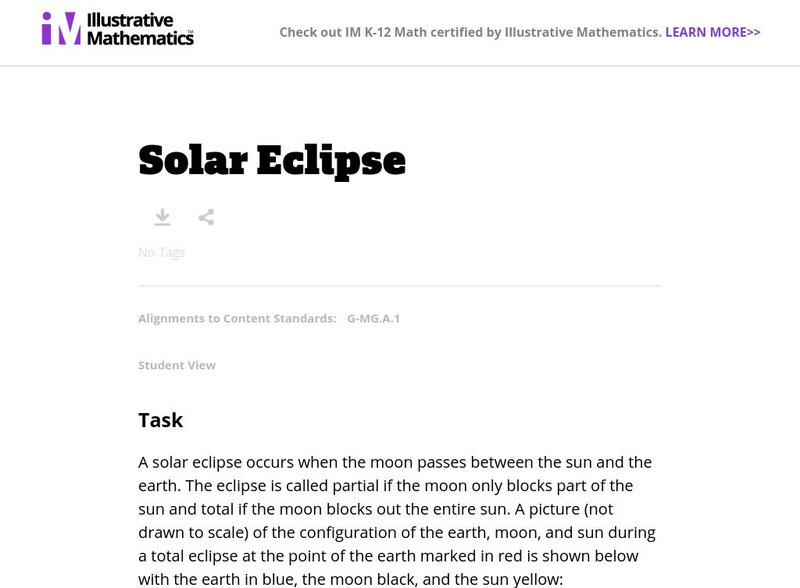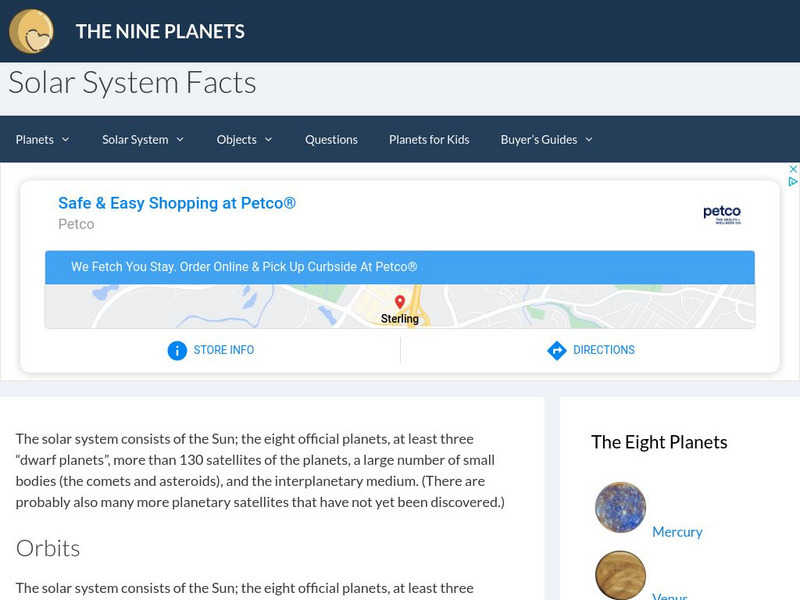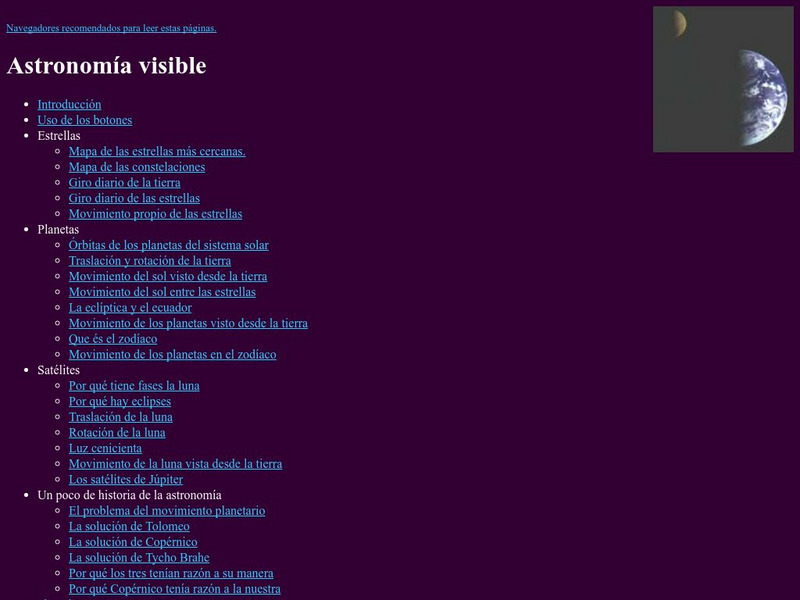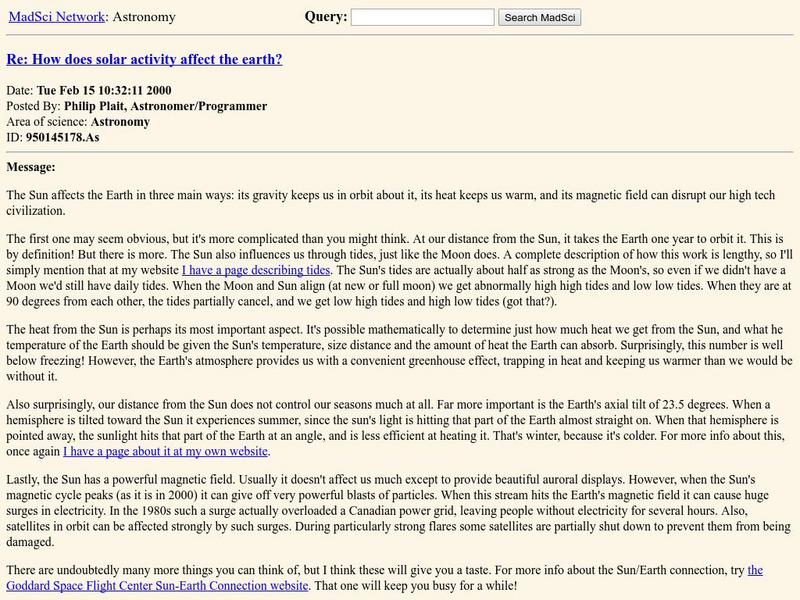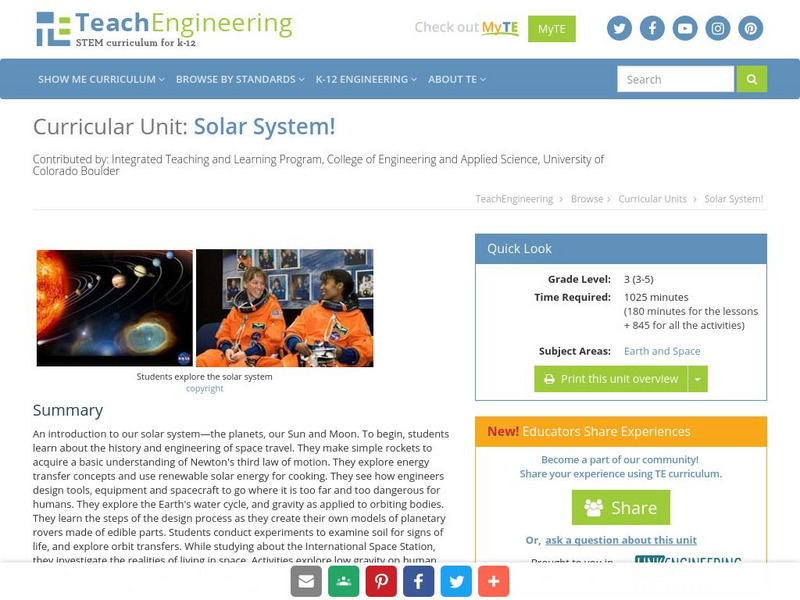Hi, what do you want to do?
TED Talks
Ted: Ted Ed: A Rare, Spectacular Total Eclipse of the Sun
Andy Cohen details the extraordinary celestial phenomenon of a total solar eclipse, and when it will next occur. [3:47]
Utah Education Network
Uen: The Night Sky
Learn about the rotation of the earth, the movement of the moon, and the position of the sun.
TeachEngineering
Teach Engineering: Lunar Lollipops
The students work in teams of two to discover the relative positions of the Earth, Sun and Moon that produce the different phases of the Moon. The students will be given a Styrofoam ball that they will attach to a pencil so that it looks...
Illustrative Mathematics
Illustrative Mathematics: G Mg Solar Eclipse
In this task, students investigate why total solar eclipses are rare. They will learn that, in addition to requiring the positioning of the Sun, Moon, and Earth, the Moon can only completely block out the Sun when it is closest to the...
Nine Planets
The Nine Planets: An Overview of the Solar System
A detailed overview of the history, mythology, and current scientific knowledge of each of the planets and moons in the solar system.
Ministerio de Educación (Spain)
Ministerio De Educacion: Astronomia Visible
This site has maps of the nearest stars and constellations. Earth and star daily rotation, proper motion of the stars and many other topics about the solar system are also shown.Read phonetically
Other
Ellinogermaniki Agogi: Eratosthenes Experiment
A profile of the ancient Greek mathematician, geographer, and astronomer, Eratosthenes. Looks at his many accomplishments, including measuring the circumference of the Earth and the distance to the Moon and the Sun. Includes links to...
Nine Planets
The Eight Planets: Just for Kids
Here is a clear, simple picture of the solar system. Click on the names of the planets to learn more about each. Clicking on underlined terms takes you to more and more detailed scientific information.
MadSci Network
Mad Scientist: Why High Tide Away From the Moon or Sun?
An excellent and thorough answer to the often asked question about high tide "bulges" on the side of Earth facing away from the Moon or Sun.
ClassFlow
Class Flow: Phases of the Moon
[Free Registration/Login Required] This flipchart demonstrates how the positions of the Earth, Moon and Sun cause phases of the Moon. It also illustrates the positions of the Earth, Moon, and Sun during a day and a month's time.
Enchanted Learning
Enchanted Learning: Earth's Oceans Tides
This site explains what tides are and the difference between Proxigean Spring Tides, spring tides, and neap tides, and how these are formed. Graphic illustrations are provided.
Ducksters
Ducksters: Earth Science for Kids: Ocean Tides
Did you know the rising and falling of the sea level is caused by the gravity of the Moon and the Sun? Kids learn about ocean tides including tidal currents and types of tides on this site.
Exploratorium
Exploratorium: Third From the Sun
This site offers a short history of the evolution of the space program and man's quest for more revealing and detailed pictures of the earth.
PBS
Pbs Learning Media: Our Solar System Lithograph Set
View these amazing high-quality images of our solar system from NASA with this lithograph set. Each lithograph contains images, facts, dates, and general information on a particular subject. Background information and teaching tips are...
Better Lesson
Better Lesson: Our Sky
What objects are in the day sky and the night sky? How do they seem to move? Come and explore with us as we discover the sun, moon, planets and stars! This detailed lesson plan includes pictures and videos of the lesson in action,...
NASA
Nasa Space Science Data Archive: Ice on Europa
With the exception of Earth, Europa currently appears to be the only body in the solar system which potentially harbors a global ocean of liquid water. The possibility of liquid water raises the possibility of life, as well. This NASA...
NASA
Nasa: Solar System Exploration
Enter our solar system to interact with the planets, moons, asteroids, meteors, and more. Investigate with NASA scientists and explore missions related to space exploration. Read facts, compare statistics, look through resources, and...
Better Lesson
Better Lesson: Our Stars
For this lesson, students will observe and communicate how the stars are in the sky both day and night. The extremely detailed lesson includes photos and videos of the lesson in actions, examples of student's work, materials, parent...
NASA
Nasa: Great Images in Nasa
Fascinating collection of images from NASA, chosen for their historical or aesthetic significance. Images are searchable by subject, by NASA center, and by keyword, and each is available in three sizes. With links to more information...
PBS
Pbs: The Conquistadors: Growth of the Inca Empire
Find out about the incredible and widespread Inca Empire. You can read about the geography of the empire, the religion, governmental structure, record-keeping system, and diet. Be sure to click on the hyperlinks or pictures to get even...
TeachEngineering
Teach Engineering: Solar System!
An introduction to our solar system: the planets, our Sun and our Moon. Students begin by learning the history and engineering of space travel. They make simple rockets to acquire a basic understanding Newton's third law of motion. They...
Cornell University
Cornell University: Astronomy: Eclipses
This site from the Astronomy Department of Cornell University provides brief introduction to both solar and lunar eclipses. Links are provided for pictures and charts of the eclipses, and this is a good site to check out on the subject.
Annenberg Foundation
Annenberg Learner: Teachers' Lab: A Private Universe
This section is dedicated to educators to become expert instructors on topics like: distance between Earth, the Sun, and the moon, the phases of the moon, and reason for the seasons. Site includes information about how to address...
Other popular searches
- Earth Sun and Moon
- Earth, Sun and Moon
- Earth and Moon and Sun
- Earth, Moon, and Sun
- Moon Earth and Sun Rotations
- Moon, Sun and Earth
- Sun, Moon and Earth
- Earth, Sun, and Moon








